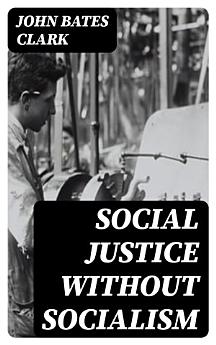Social Justice Without Socialism
John Bates Clark
сеп 2022. · DigiCat
E-knjiga
16
Stranica
family_home
Ispunjava uslove
info
reportOcene i recenzije nisu verifikovane Saznajte više
O ovoj e-knjizi
In "Social Justice Without Socialism," John Bates Clark presents a compelling argument for the potential of capitalism to achieve social justice without the need for socialist frameworks. The book explores the interplay between economic theory and social ethics, emphasizing the moral obligations of individuals in a capitalist society. Clark's literary style is both incisive and accessible, blending rigorous analysis with real-world examples that illustrate the viability of his ideas. Written in the early 20th century, the work is situated within the broader context of progressive thought, challenging the prevailing notions of wealth distribution while advocating for a reformed capitalism that prioritizes social welfare. John Bates Clark was a prominent American economist, whose work significantly influenced the development of economic theory in the United States. His commitment to addressing the social issues of his time, alongside his critique of socialism, stems from his belief in the potential for capitalism to evolve positively. Clark's theories on marginal productivity and the function of entrepreneurship reflect his deep understanding of economic systems and their societal implications, making his insights relevant in discussions of equity and justice. "Social Justice Without Socialism" is essential reading for anyone interested in economic justice, political philosophy, or the mechanics of capitalism. Clark's nuanced arguments provide a robust counterpoint to socialist ideologies, making it a vital resource for students, scholars, and anyone seeking a deeper understanding of the balance between individual liberty and social responsibility in modern society.
O autoru
John Bates Clark (1847–1938) was an eminent American economist, renowned for formulating the marginal productivity theory of distribution, which highlights the relationship between the contribution of factors of production and the incomes they derive. His scholarship extended into discussions about social policies and economic justice, standing as a precursor to modern welfare economics. Clark's principles stressed the efficacy of competition in a capitalist system while underscoring the imperative nature of ethical practices in economic affairs. His seminal work, 'Social Justice Without Socialism' (1914), argued persuasively against socialist systems, favoring an evolution of the capitalist structure to eradicate extreme inequalities and promote social justice. This book represents Clark's balanced approach, seeking a middle ground where social justice could be achieved without forsaking the economic efficiency of a market economy. His writing style was characterized by clarity and directness, endeavoring to be accessible to both the scholarly community and the informed public. Clark's legacy includes not just his economic theories but also a dedication to social betterment through the context of rigorous economic thought. His influence continued through the generations, not only through his writings but arguably reaching its zenith with his son, John Maurice Clark, who also became a prominent economist in his own right.
Ocenite ovu e-knjigu
Javite nam svoje mišljenje.
Informacije o čitanju
Pametni telefoni i tableti
Instalirajte aplikaciju Google Play knjige za Android i iPad/iPhone. Automatski se sinhronizuje sa nalogom i omogućava vam da čitate onlajn i oflajn gde god da se nalazite.
Laptopovi i računari
Možete da slušate audio-knjige kupljene na Google Play-u pomoću veb-pregledača na računaru.
E-čitači i drugi uređaji
Da biste čitali na uređajima koje koriste e-mastilo, kao što su Kobo e-čitači, treba da preuzmete fajl i prenesete ga na uređaj. Pratite detaljna uputstva iz centra za pomoć da biste preneli fajlove u podržane e-čitače.







